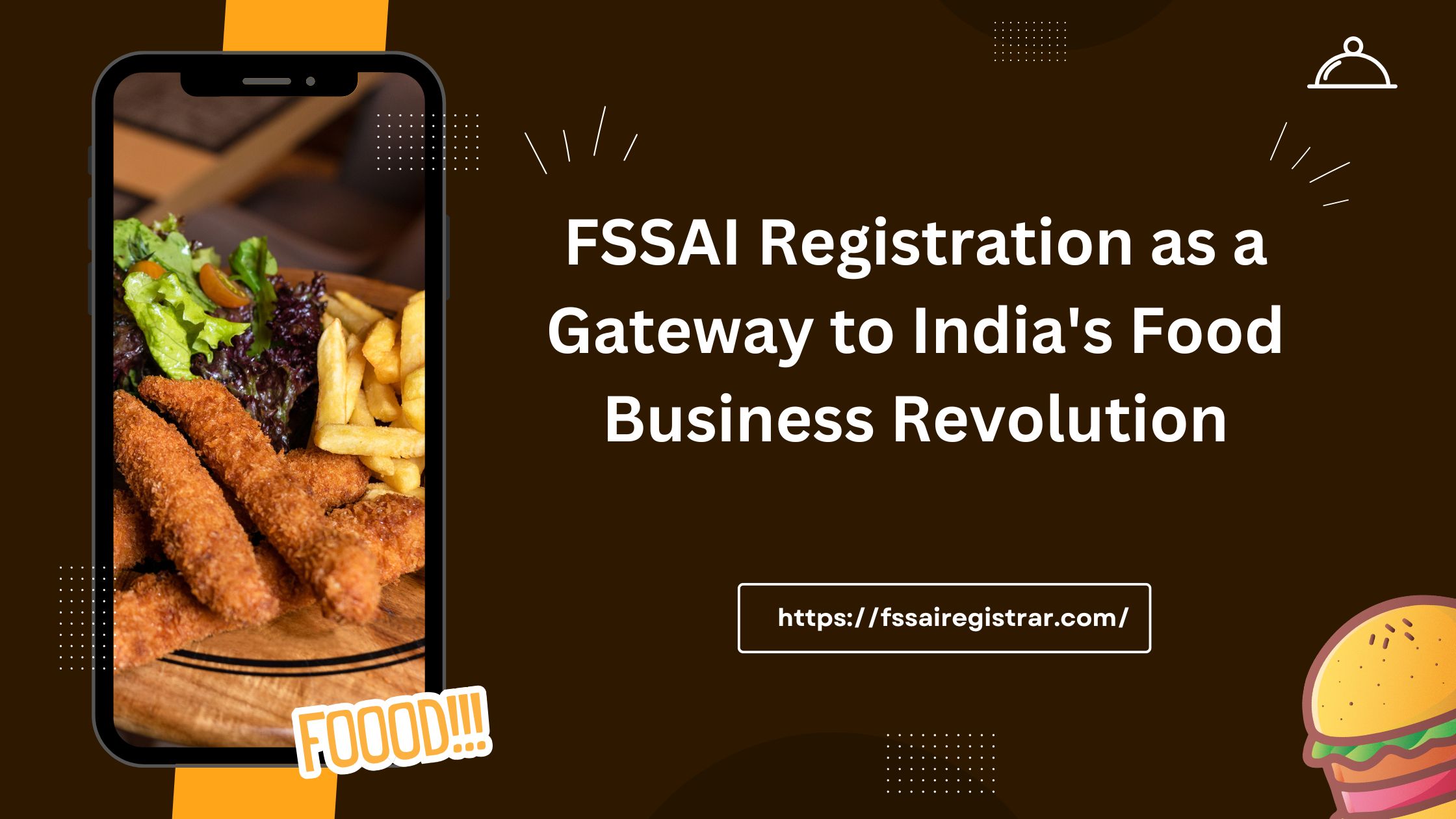FSSAI Registration as a Gateway to India’s Food Business Revolution
Introduction India’s food sector is one of the fastest-growing markets in the world. From traditional street food vendors to modern...

Introduction
India’s food sector is one of the fastest-growing markets in the world. From traditional street food vendors to modern organic health brands, the diversity is unmatched. But with such vastness comes the need for safety, transparency, and trust. This is where FSSAI Registration plays a crucial role.
The Food Safety and Standards Authority of India (FSSAI) governs and regulates food safety laws in India. But in recent years, its online registration process has transformed how food businesses enter and operate in the industry. In this article, we explore how FSSAI Registration is not just a legal requirement but a powerful tool for building a successful food business in modern India.
Understanding FSSAI Registration
FSSAI Registration is a mandatory process for anyone involved in the manufacture, processing, packaging, storage, distribution, or sale of food products. It ensures that the food business complies with the Food Safety and Standards Act, 2006, and follows proper hygiene and safety practices.
Types of FSSAI Licenses:
Basic Registration
- Who Needs It: Small food businesses, home kitchens, and petty food sellers.
- Annual Turnover: Up to ₹12 lakhs
- Examples: Tiffin services, street food vendors, and homemade snack sellers.
State License
- Who Needs It: Medium-scale food businesses like manufacturers, restaurants, and small food factories.
- Annual Turnover: Between ₹12 lakhs to ₹20 crores
- Examples: Mid-size bakeries, food processors, medium restaurants.
Central License
- Who Needs It: Large-scale manufacturers, importers, exporters, and food businesses operating in multiple states.
- Annual Turnover: Above ₹20 crores
- Examples: Packaged water companies, food exporters, and national-level food chains.
Why FSSAI Registration is a Business Game-Changer
While most businesses see it as a legal formality, smart entrepreneurs realize that FSSAI registration is much more—it’s a marketing asset, trust-building tool, and growth enabler.
Builds Consumer Trust
In an age where consumers are health-conscious and digitally aware, the FSSAI logo on your packaging or store builds immediate trust.
A survey found that 78% of consumers prefer buying packaged food that displays the FSSAI number.
Unlocks Bigger Market Access
Major e-commerce platforms like Amazon, Flipkart, and BigBasket require FSSAI licenses for all food sellers. Without registration, you’re locked out of the booming online food market.
Essential for Export Business
Planning to export your pickles or millet snacks to the US or UAE? FSSAI registration is a mandatory document for customs and international clearances.
Enables Loans & Investments
Banks, NBFCs, and even angel investors often check FSSAI status before funding food startups. It reflects that the business is compliant and serious.
Boosts Brand Value
When you display an FSSAI license, your brand is seen as responsible and authentic, leading to better customer loyalty.
How to Register for FSSAI: Simple Step-by-Step Guide
Whether you’re a cloud kitchen owner or a local sweet shop vendor, here’s how you can register for FSSAI in a few easy steps:
Step 1: Open the FSSAI Portal: Go to the official FSSAI registration website using your phone or computer.
Step 2: Fill in Your Details: Enter all necessary information such as:
- Your name
- Mobile number and email
- Business name and type
- The food category you deal with
- Complete business address
Step 3: Upload PAN Card: Scan and upload a clear copy of your PAN card for identity verification.
Step 4: Check and Submit: Go through all the details you’ve entered. If everything looks correct, submit the form.
Step 5: Make Payment: Choose your payment method—credit/debit card, net banking, or UPI—and pay the fee based on your license type.
Step 6: Complete OTP Verification: You’ll get a call or email from the team. Share the OTP sent to your phone/email to verify your identity.
Step 7: Site Visit (If Needed): If required, an FSSAI officer may visit your business place for a quick inspection.
Step 8: Download Your License: Once your application is approved, you’ll get your FSSAI license. You can download it directly from the portal.
Who Needs FSSAI Registration?
Home-Based Food Businesses: People selling homemade snacks, pickles, cakes, or tiffin services.
Street Food Vendors: Chaat stalls, juice sellers, and food carts on roadsides.
Restaurants and Cafes: Small to large eateries, cloud kitchens, and food delivery kitchens.
Food Manufacturers: Businesses involved in making packaged food, chips, jam, sauces, etc.
Grocery and Retail Stores: Shops selling packaged food, grains, spices, or dairy products.
Food Wholesalers and Distributors: Businesses that store and supply food items in bulk.
Importers and Exporters of Food: Anyone dealing in international food trade must have an FSSAI Central License.
Online Food Sellers: Selling food through websites, Instagram, or apps like Zomato and Swiggy.
Food Transporters: Businesses transporting food via trucks or delivery services.
Food Packaging Units: Units that pack food items, even if they don’t make the food themselves.
Common Mistakes to Avoid During FSSAI Registration
Choosing the wrong license type: Many home food sellers mistakenly apply for State licenses. If your turnover is below ₹12 lakhs, start with Basic Registration.
Incomplete documents: Uploading blurry or mismatched documents often leads to rejection.
Not renewing on time: FSSAI licenses are valid for 1 to 5 years. Failing to renew on time can attract penalties.
Skipping product category: Always list your product type (e.g., dairy, bakery, beverages) properly. Missing categories can cause trouble later.
FSSAI in the Digital Era: Smart Tools & Innovations
To make things easier for food businesses, FSSAI has launched several tech-driven initiatives:
Food Safety Connect App: A mobile app for consumers to report unhygienic practices and check FSSAI numbers.
Eat Right India Campaign: Promotes safe and healthy eating by partnering with restaurants, food trucks, and schools.
QR Code Verification: Some modern brands now print a scannable QR code on the label that links to their FSSAI details—this builds customer confidence.
FSSAI’s Role in Supporting Startups & Women Entrepreneurs
FSSAI is also pushing for inclusive growth by supporting:
- Women-led food businesses through simplified registration
- Startup-friendly guidelines for small kitchens and online sellers
- Special initiatives with FICCI and state agencies for training and certification
Note:- Now you can easily apply for Tatkal FSSAI Registration
Conclusion
In today’s competitive food industry, FSSAI registration is not just a license, it’s your business identity. It opens doors to new markets, builds customer trust, and ensures you’re legally and ethically compliant.
With the rise of online food platforms, export opportunities, and health-conscious buyers, getting FSSAI registered early is a smart and strategic move for any food entrepreneur. Whether you’re a local snack stall owner or a health food startup, the 14-digit FSSAI number could be your ticket to long-term success.





